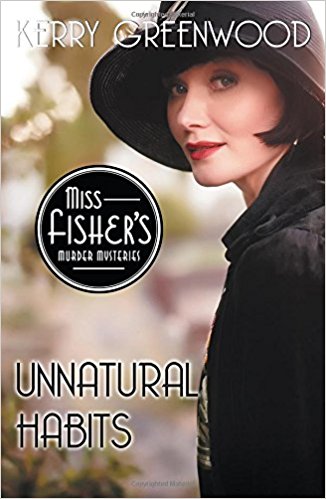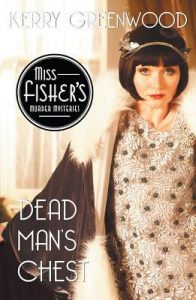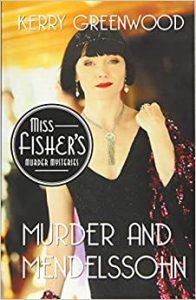 Unnatural Habits (Phryne Fisher, #19) by Kerry Greenwood
Unnatural Habits (Phryne Fisher, #19) by Kerry Greenwood Format: eARC
Source: supplied by publisher via Edelweiss
Formats available: hardcover, paperback, ebook, audiobook
Genres: historical fiction, historical mystery, mystery
Series: Phryne Fisher #19
Pages: 348
Published by Poisoned Pen Press on October 1, 2012
Purchasing Info: Author's Website, Publisher's Website, Amazon, Barnes & Noble, Kobo, Bookshop.org
Goodreads
The decidedly raven-haired Miss Phryne Fisher returns to delve deep into the dark side of Melbourne, Australia.
It's 1929, and girls are going missing. Little, pretty golden-haired girls. And they're not just pretty. Three of them are pregnant, poor girls from the harsh confines of the Magdalene Laundry. People are getting nervous.
Polly Kettle, a pushy, self-important girl reporter with ambition and no sense of self preservation, decides to investigate and promptly goes missing herself.
It's time for Phryne and Dot to put a stop to this and find Polly Kettle before something quite irreparable happens to all of the missing girls. It's all piracy and dark cellars, convents and plots, murder and mystery...and Phryne finally finds out if it's true that blondes have more fun.
My Review:
 I was looking for a book where I would sorta/kinda know what I was in for, and one in which I could sink without a trace for a few hours. I realized that I hadn’t looked in on Phryne for a while (my goodness it’s been over a year!) so I took myself off and into the next book in the series and I most definitely got exactly what I was hoping for.
I was looking for a book where I would sorta/kinda know what I was in for, and one in which I could sink without a trace for a few hours. I realized that I hadn’t looked in on Phryne for a while (my goodness it’s been over a year!) so I took myself off and into the next book in the series and I most definitely got exactly what I was hoping for.
The mystery, actually the multiple mysteries, in Unnatural Habits take Phryne to dark corners of Melbourne where a lesser woman would fear to tread – if she could bring herself to even acknowledge that she knew about most of them.
But Phryne doesn’t care what other people think about much of anything, including, most especially herself. So when she sees a young woman about to be beaten up by a brace of thugs in one of the less salubrious parts of town, Phryne does not hesitate even a moment to weigh up the possible consequences.
After all, she knows that her lover, Lin Chung, has assigned several of his men to keep watch over her when she travels into parts of town where angels and demons alike would fear to tread. So Phryne rescues the young woman, Lin Chung’s men “explain” to the bullyboys the error of their ways and Phryne finds herself in the middle of a case that begins with missing pregnant women not even the police are investing much effort in searching for.
When the tally of the missing grows to include actresses looking for a break, very young – and blonde – daughters of the middle class, and even the young woman Phryne rescued – who turns out to be a newspaper reporter hunting for her first big scoop – Phryne calls on her friends in some very low places indeed. Where she manages to air the dirty laundry of the princes of the church, laundry that seems to be wrapped around the mangles of the church-sponsored workhouse known as the Magdalene Laundry.
In the end, Phryne commits piracy – with more than a bit of help from Bert and Ces – in order to bring justice in a case that no one is willing to admit needed to be solved.
Escape Rating A-: Phryne Fisher is a fascinating character because her conscience is explicitly NOT the voice of society, her parents, other people or any kind of powers-that-be telling her what she SHOULD or should not be doing because she’s a woman. Or for any other reason whatsoever. Phryne does what she pleases, however she pleases, because she can. She’s been rich and she’s been poor and she’s very much aware that being rich is not only better but that it gives her license to do the necessary without worrying about anyone’s approval.
And that’s important to this case because the missing women she is looking for are so-called “fallen” women. The Magdalene Laundry was a real place, and like so many of the charitable institutions operated by the Catholic Church in many places, it was horrifically abusive. The women sent there were unwed mothers who were expected to work under slave labor conditions until they got close to their due dates, when they were shipped off to rural “lying in” homes that could be just as abusive until they gave birth. Their babies were taken away without the women’s consent and put up for adoption. Or they were if they survived the cruel treatment inflicted upon their mothers.
That three of these women managed to escape before their babies were born isn’t a surprise. That no one seriously wants to look for them is unfortunately even less of one. The theories for their disappearance – as ludicrous as most of those theories are – cause Phryne to search among the demimonde of Melbourne to make sure that they’re not in a brothel – and equally that none of the brothels or other private houses of pleasure will be blamed for their disappearance – because both are all too possible. Likewise, no one is looking for the missing actresses, because actresses are assumed to be prostitutes whether they are or not.
That Phryne is not just acquainted with Melbourne’s fleshpots but likes the people who work in these establishments considerably more than most people of so-called “polite” parts of society is not a surprise for Phryne but certainly would be for anyone in the upper or middle classes. Part of what makes Phryne so refreshing is that her internal voice – and frequently her external one – is not just clever and witty but is unequivocally pragmatic and remarkably free of prejudice in regards to race, religion or sexual orientation. For the most part she takes people as she finds them. Her most scathing commentaries are saved for hypocrites, pretenders and fakers and I love her all the more for it.
 I’m probably belaboring this point by now, but if you come to the Phryne Fisher books in the hopes of seeing more of Miss Fisher’s Murder Mysteries, you’re probably going to be disappointed. But if you’re looking at the books for a sparkling, witty historical mystery with a take-charge female protagonist who strides through her world doing her best to make it better by ignoring social norms, taking no prisoners and puncturing as many of the pomposities of the powers-that-be as she possibly can, then Phryne is still very much your cuppa.
I’m probably belaboring this point by now, but if you come to the Phryne Fisher books in the hopes of seeing more of Miss Fisher’s Murder Mysteries, you’re probably going to be disappointed. But if you’re looking at the books for a sparkling, witty historical mystery with a take-charge female protagonist who strides through her world doing her best to make it better by ignoring social norms, taking no prisoners and puncturing as many of the pomposities of the powers-that-be as she possibly can, then Phryne is still very much your cuppa.
She certainly is mine. So I’ll be back the next time I’m searching for Phryne’s particular brand of derring-do with Murder and Mendelssohn. There’s only one more book in the series (so far) after that, so I’ll be stretching this little pleasure out as far as I can stand!






















Phryne is a delight!